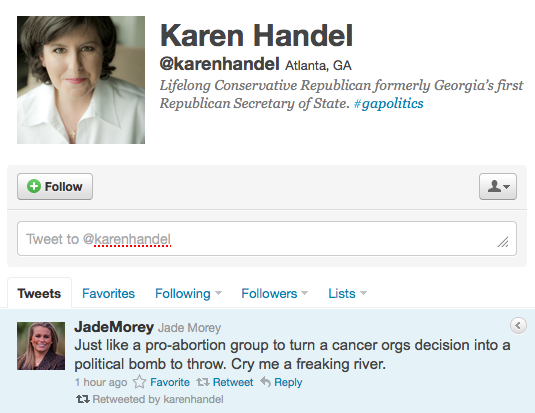No matter how you feel about abortion services or Planned Parenthood, you have to agree that the Susan G. Komen for the Cure foundation handled its decision-making and communications regarding its defunding of Planned Parenthood very, very poorly:
- They did not discuss the decision with their affiliates, let alone involve those affiliates in the decision. Some of the affiliates (Oregon and Connecticut, and perhaps more) even issued press releases after the Komen headquarters announcement asking for their HQ to reconsider. When your organization’s own affiliates are asking PUBLICLY for you to reconsider a decision, you have made a grave error.
- They gave contradictory statements about why they were defunding Planned Parenthood. Sometimes they said it was because of a new policy not to fund any organization under investigation by state or federal authorities – yet they had no plans to discontinue funding for Penn State! They said the decision wasn’t political, nor because they had hired a dedicated, outspoken advocate against the right to abortion services – Karen Handel – who retweeted this on her Twitter account, contradicting Komen’s statements about this NOT being a political decision:
The original image from Lisa McIntire
Today, Komen somewhat reversed its decision regarding Planned Parenthood, but left the door open to stop funding the organization after the current funding cycle. It has not gone unnoticed that Komen has also stopped funding stem cell research. It has also has not gone unnoticed that Karen Handel is still a senior vice president at the Komen foundation.
This PR nightmare is not over for the Komen foundation. Can the foundation rebuild trust with the thousands of women who are saying they will never support the organization again? Can it successfully make this switch in its work, avoiding any organization that garners criticisms from far-right religious advocates, and therefore be the target of women’s rights advocates?
How should have Komen handled both this decision and the communications of such? Or is there any way for them to have done this without suffering such massive fallout with so many (now) former supporters? Share in the comments section here.
Also see: How to Handle Online Criticism.


Honestly, the best way to handle this was either not to pull the funding, or just be plain honest, "We don’t feel that funding an organization that supports abortion is really with our cause of saving lives" or something like that. yes, they’d still piss some people off, but they would come off as taking a stand and at least being honest and at least retain their modem of respect vs. now looking like an organization that you cannot trust what they will do with your money. Plus now, while it really wasn’t a reversal but a way to stop funding PP when people aren’t paying as close attention, they have now pissed off at least some of the people who would have supported them for the decision.
Well put, Alice!
You know, until this, I never paid that much attention to Komen. I assumed they were a non-partisan charity that had everyone’s back (or front), but now, after reading about the people who run it (voter purgers, Palin fans, Koch associates, etc), I’m really glad this happened. Now we all know who is running it, and where they stand. I stand with PP, and have made 2 donations this week. I’ll never buy ANYTHING Komen branded, and certainly won’t make any donations.
Thanks, "Me", for your response. I think your post is an example of the kind of passion a lot of people are feeling about this whole affair, and it’s an example of why I wonder if Komen really can ever recover from what’s happened this week.
Great post. The diagnosis from an NPR interview this morning was of course they can recover and I agree. Remember the pink ribbons on the KFC buckets? Its not like they haven’t stuck a sharp stick in their own eye before. Unfortunately, after Komen spends a boatload of money convincing us what a great corporate juggernaut (i mean nonprofit) they are then folks will walk, run, donate and still wear pink.I was in an email conversation with a Texas colleague over the weekend on an old fashioned listserv, where I was pointing to the story that is missed. When you look at Komen’s 990 you see that their programs break down as follows:Grants to other charitable organizations Year: 2009 Grants: $63,191,615 Expenses: $73,345,420Public health education & awareness programs Year: 2009 Grants: $12,503,509 Expenses: $51,570,078Health treatment and screening programs Year: 2009 Grants: $168,274 Expenses: $1,768,274See: http://nccsdataweb.urban.org/orgs/profile/751835298?popup=1#programs In other words Komen expenses $73 million to deliver $63 million in grants. That’s "pay us $2 and we will give you back $1" or with public health and awareness programs, "Give us $5 and we will give you back $1.Jayne, the bigger issue that nobody is questioning is Does the economic model of Komen equal efficient use of resources? There is a huge opportunity cost to supporting the Komen (nonprofit) Corporation because the expenses associated with getting programs to the street is anywhere from dollar for dollar to four dollars per dollar, Huge direct service dollars are lost to the corporation of Komen as they play intermediary. The PP debacle is the wake up call. will advocates use it as an opportunity to think different about women’s health as a holistic system of resources and resource distribution?
No question that, because of the decision-making & communications missteps regarding Planned Parenthood, people are now looking at these "bigger issues" that you are bringing up, Mark. I’m just still gob smacked that Koman did not know that, in a contest of loyalities, their followers would choose Planned Parenthood. Just another way they are profoundly out of touch. I really don’t see them recovering from this fiasco.